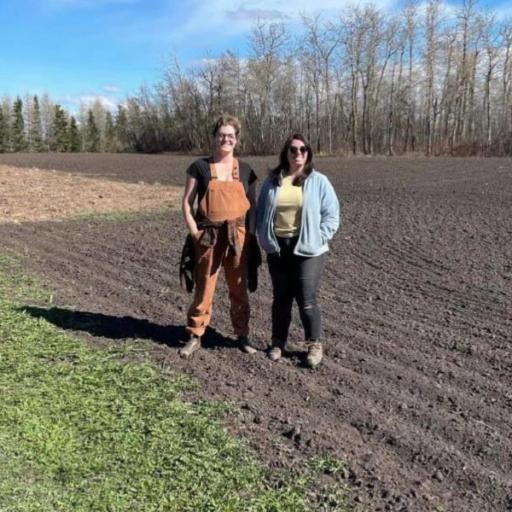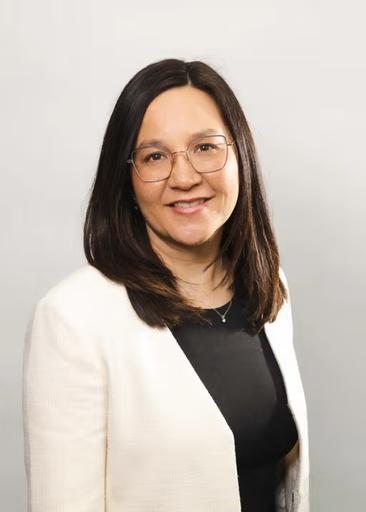November 25, 2022
Building Capacity for Land Matching in Alberta

By the Young Agrarians
In the spring of 2022, Caitlyn and Melissa officially launched their new farm, Good Thyme Gardens on leased land near Leduc. Caitlyn and Melissa both had farming and business experience and were looking to start their own small vegetable and herb farm to grow food for their local communities and to experiment with no-till farming.
As first-generation farmers, Caitlyn and Melissa did not know anyone who had land for lease. Luckily, a friend of theirs told them about the Young Agrarians (YA) Land Access Support and they immediately started looking at available land on the YA U-Map and blog. There, they connected with Vi, a landholder in Leduc who posted her market garden land opportunity through YA. Vi ran a market garden for over 40 years – she recently retired and was looking for people with farming experience to grow vegetables on her land. Caitlyn and Melissa were able to sign a one-year lease with Vi to farm on two acres of land and use all of the infrastructures on site for market gardening, such as the coolers, greenhouse, wash stations, harvest bins, carts, and irrigation.
Their first season has been a whirlwind with many successes. Overall, Caitlyn and Melissa are quite happy with the land access arrangement – there was minimal infrastructure investment and soil preparation (and therefore minimal risk) and the land is well suited for growing vegetables. They are also getting a lot of support from the farming community. For example, they received a big order for chive flowers for a well-known restaurant from a farming friend who couldn’t fill the order. Caitlyn and Melissa are already excited about renewing their lease for next year and are dreaming about how they’ll improve their farm operation.
The process of finding land to lease did present Caitlyn and Melissa with some challenges though. Neither Caitlyn and Melissa nor Vi had any experience writing or negotiating a lease. They found it difficult to determine what was a fair lease rate and how to structure the lease to benefit both sides. They used the lease template from YA as a starting point and tried to customize it with the help of law students at the University of Alberta, but since the students had no experience with agricultural leases they were not able to help. Caitlyn and Melissa were also not able to incorporate the lease into Vi’s estate planning, which made the arrangement less secure. They noted that it would have been beneficial to have someone that could support them in navigating this process.
The land matching program was incredibly helpful to us as we didn’t have many connections in rural communities being from the city. The program facilitated an easy connection, and the map feature was helpful for us to decide which conditions we would like to work under and compare options. It was great to have a resource person to ask questions. – Caitlyn, Good Thyme Gardens, Alberta land seeker
A major insight from this case study is the need for more support with negotiating and writing leases. To address this need YA is looking to make the Alberta Land Access Coordinator a full-time role. With increased capacity, the coordinator would be able to work with landholders and land seekers to identify goals and needs, be present for introductions and site visits to guide the conversation between both sides, facilitate lease term negotiations, write lease clauses to suit the land arrangement prior to review by a lawyer, and follow up with landholders and land seekers after they’ve been matched.
In B.C., where YA delivers a full spectrum of hands-on land matching services including lease development through the B.C. Land Matching Program, participants express that support with negotiations and agreements is the most valued aspect of the services. The program model and infrastructure is tried and true and could be implemented in Alberta to better support landholders and farmers to navigate land sharing.
For new farmers and those wishing to purchase land, the high cost of land and the difficulty of finding land for sale are major barriers. Many new farmers are also wondering how they will be able to pay for the land (often through supplemental off-farm income) and have the time to properly manage the farm.
As part of this project, YA conducted engagement sessions with rural real estate stakeholders. YA learned that both REALTORS® and farmers are concerned about this challenging situation for new farmers. They recommend picking an area to either buy or lease land and talk to as many people as possible, from bankers and local businesses to neighbours and municipal workers to help broadcast your interest, as many transactions occur off-market. To minimize start-up risk, stakeholders also suggested that new farmers start out small to optimize farm systems and figure out if they enjoy it. They can scale up once they have relationships with locals and a better understanding of how to run a farm.
REALTORS® suggested that new farmers focus on vertical integration, diverse farm products, and niche crops, like organic or whole animal butchery, and access direct-to-consumer markets whenever possible. This style of farming is aligned with how the farmers in the YA network want to approach it.
This project was funded in 2021 through the Foundation’s Development Grant Program, building on a grant from the Foundation in 2018 supporting the development of the Alberta Land Access Guide. We’re proud to support this work that supports sustainable land use planning and management, in turn benefitting the real estate industry and Albertans.
Topic
Similar News


